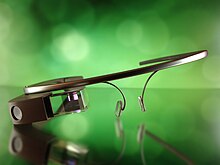
Google Glass
Optical head-mounted computer glasses / From Wikipedia, the free encyclopedia
Dear Wikiwand AI, let's keep it short by simply answering these key questions:
Can you list the top facts and stats about Google Glass?
Summarize this article for a 10 year old
Google Glass, or simply Glass, is a brand of smart glasses developed and sold by Google. It was developed by X (previously Google X),[9] with the mission of producing a ubiquitous computer.[1] Google Glass displays information to the wearer using a head-up display.[10] Wearers communicate with the Internet via natural language voice commands.[11][12]
 | |
 Google Glass Explorer Edition | |
| Also known as | Project Glass |
|---|---|
| Developer | |
| Manufacturer | Foxconn |
| Type | Optical Head-Mounted Display (OHMD), Peripheral Head-Mounted Display (PHMD), Wearable technology, Head-up display |
| Release date | Developers (US): February 2013 (February 2013)[1] Public (US): Around 2013[2] |
| Introductory price | Explorer version: US$1,500 Standard edition: US$1,500[3] |
| Operating system | Glass OS[4] (Google Xe Software[5]) |
| CPU | OMAP 4430 System on a chip, dual-core processor[6] |
| Memory | 2 GB RAM[7] |
| Storage | 16 GB flash memory total[6] (12 GB of usable memory)[8] |
| Display | Prism projector, 640×360 pixels (equivalent of a 64 cm/25 in screen from 2.4 m/8 ft away) |
| Sound | Bone conduction transducer[8] |
| Input | Voice command through microphone,[8] accelerometer,[8] gyroscope,[8] magnetometer,[8] ambient light sensor, proximity sensor |
| Controller input | Touchpad, MyGlass phone mobile app |
| Camera | 5 MP photos 720p video[8] |
| Connectivity | Wi-Fi 802.11b/g,[8] Bluetooth,[8] micro USB |
| Power | 570 mAh internal lithium-ion battery |
| Mass | 36 g (1.3 oz) |
| Backward compatibility | Any Bluetooth-capable phone; MyGlass companion app requires Android 4.0.3 "Ice Cream Sandwich" or higher or any iOS 7.0 or higher[8] |
| Related | Microsoft HoloLens, Magic Leap, Ray-Ban Stories |
| Website | google |
Google started selling a prototype of Google Glass to qualified "Glass Explorers" in the US on April 15, 2013, for a limited period for $1,500, before it became available to the public on May 15, 2014.[13] It has an integrated 5 megapixel still/720p video camera. The headset received a great deal of criticism amid concerns that its use could violate existing privacy laws.[14]
On January 15, 2015, Google announced that it would stop producing the Google Glass prototype.[15] The prototype was succeeded by two Enterprise Editions,[16][17] whose sales were suspended on March 15, 2023.[18]